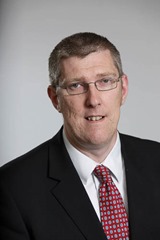John O’Dowd: excellence and equality
 Education Minister John O’Dowd outlines his priorities for schools and the need for families and communities to value education more highly.
Education Minister John O’Dowd outlines his priorities for schools and the need for families and communities to value education more highly.
In May 2011, I had the honour of being appointed Minister for Education in the North. I knew it would be a challenging post. However, I also knew that I would be building on the solid foundations laid by my predecessor, Caitríona Ruane.
At that time, I signalled what my top two priorities would be during my tenure – to raise educational standards, and to close the attainment gap between those most and those least disadvantaged.
I wanted to create a system that delivered excellence but one that also delivered equality. In the intervening period, I have embarked on an extensive and ambitious programme of work to ensure these aims are achieved.
Among this work has been the instigation of the process known as area planning. Area planning is about ensuring we have a network of strong, sustainable schools, in the right place and of the right size to serve the needs of pupils. It is about putting the needs of young people before the needs of institutions and identifying the provision required not just today but also in the future.
That process is progressing well and the shape of future provision in many areas is already taking shape.
I am also looking at proposals around greater use of shared education. There is much good work already being done in our education system as schools collaborate with each other and with further education institutions to deliver a wider range of choice for students. I believe there is even more can be done and will be looking at options for expanding sharing in the years to come.
The Entitlement Framework, meanwhile, which became a legal requirement in September, is requiring schools to deliver access for their pupils to a minimum of 18 courses at Key Stage 4 and 21 at post-16, regardless of where they study. The Entitlement Framework ensures that all post-primary schools not only teach the same curriculum but, importantly, have the flexibility to offer a wide range of subject choices to both inspire and engage pupils: choices that have clear pathways to further and higher education training and employment and that are relevant to the needs of our 21st century economy.
This work will help improve the delivery of education but if we are to truly target the tail of underachievement, we must look at directing more resources to those who need them most.
That is why I have further extended the criteria for free school meal entitlement to ensure more children from low income families can avail of this support.
In the final year of direct rule, 60,000 children were entitled to free school meals. By last year, the extended criteria introduced by Caitríona Ruane had seen that number grow to 80,000. My decision in June to further extend the criteria will see an estimated 15,000 extra children benefit.
However, I am not just concerned with supporting children from disadvantaged backgrounds directly. I want to increase the support provided to the schools that educate them.
That is why, following recommendations made by an independent panel, I launched a consultation on proposed changes to the Common Funding Scheme that funds schools. I will want to hear feedback from the consultation before making any final decisions, but I do want to ensure adequate support exists for those schools educating children from the most disadvantaged backgrounds.
So where are we now? Last year, 62 per cent of school leavers achieved at least five GCSEs at A*-C (including equivalents) including GCSE English and GCSE maths. This has grown from just over 54 per cent in the last year of direct rule and reflects the combined efforts of teachers, pupils, parents and policy-makers to deliver continued improvements.
Over the same period, the proportion of children entitled to free school meals achieving at this level rose increased from 27.1 per cent to 34.1 per cent whilst for children not entitled to free school meals, the proportion achieving at that level increased from 60 per cent to 67.9 per cent.
 Again, this growth is welcome, but why does this gap exist? Why does a child’s socio-economic background continue to influence their educational outcomes?
Again, this growth is welcome, but why does this gap exist? Why does a child’s socio-economic background continue to influence their educational outcomes?
This is, perhaps, the biggest challenge facing us and one I will continue to work to address.
I cannot do this alone. I will need the support of schools, of teachers, and of school leaders. However, even this will not be enough.
That is why I launched the advertising campaign ‘Education Works’ last year. I am quite clear that, important as teachers are, they cannot help a child reach their full potential without the support of parents, family members and wider communities.
Education does not start and stop at the school gates. The campaign is designed to show parents that little things, such as reading to their child, or taking an interest in their homework, can make a real difference to their child’s education and can open a world of opportunities for them.
As I look ahead to the remainder of my time in office, I remain focussed on the twin aims of raising educational outcomes and closing the performance gap. I will continue to do all in my power to drive further improvements and believe that, with the support of our talented and committed education workforce, and the involvement of parents and communities, both these aims are within reach.





